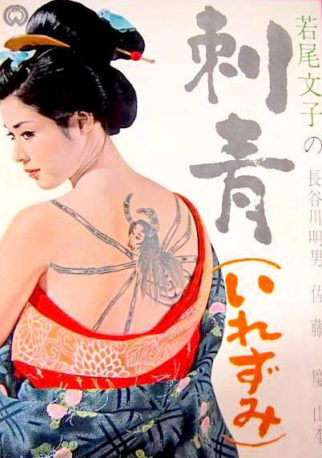 A key work by one of Japan’s neglected masters of cinema, director Yasuzo Masumura, who in IREZUMI created a starkly violent and perverse account of obsession, revenge and elaborate tattoos. The basis for this 1966 film was Junichiro Tanizaki’s famed 1910 story “Shisei” (“The Tattooist”). The film adaptation was scripted by filmmaker Kaneto Shindo, of the horror classics ONIBABA and KURNOEKO. A similarly macabre sensibility is evident in IREZUMI (TATTOO).
A key work by one of Japan’s neglected masters of cinema, director Yasuzo Masumura, who in IREZUMI created a starkly violent and perverse account of obsession, revenge and elaborate tattoos. The basis for this 1966 film was Junichiro Tanizaki’s famed 1910 story “Shisei” (“The Tattooist”). The film adaptation was scripted by filmmaker Kaneto Shindo, of the horror classics ONIBABA and KURNOEKO. A similarly macabre sensibility is evident in IREZUMI (TATTOO).
It was one of several important films directed by the prolific Yasuzo Masumura during the mid-to-late sixties. Others include MANJI (1964), RED ANGEL (1966) and Masumura’s arguable masterpiece THE BLIND BEAST (1969). As with MANJI (also adapted from a Tanizaki text), IREZUMI was remade several times over the years, though never as powerfully.
The feisty young Otsuya is having an affair with the earthy Shinsuke, much to the consternation of her wealthy parents. Otsuya and Shinsuke decide to elope, heading to the house of their questionable friend Gonji. Gonji in turn shows his true nature by selling Otsuya to a geisha house and arranging for Shinsuke to be killed. Shinsuke, however, winds up fatally stabbing his would-be murderer through the forehead(!).
Otsuya is delivered into the clutches of the slimy Tobukei, who runs an exclusive brothel. Tobukei demands that Otsuya get tattooed by his resident tattoo artist Seikichi, who becomes obsessed by the purity and smoothness of Otsuya’s skin. He creates a tattoo of a giant black spider on Otsuya’s back that appears to have an equivalent psychological impact, with her nature becoming increasingly predatory and spider-like.
In the meantime Shinsuke becomes a fugitive. He tracks down Otsuya and begs her to run off with him, but she’s now fully into spider-woman mode, despite her passion for Shinsuke. She enlists him in her campaign of revenge, forcing him to assist in tracking down and killing Gonji and his wife.
Otsuya’s vengeance doesn’t end there. She becomes determined to do in Tobukei, and once again forces Shinsuke to carry out the killing. Shinsuke, however, is becoming increasingly guilt-ridden and jealous. He also grows physically abusive toward Otsuya, and to an extremely dangerous degree, while the tattoo artist Seikichi becomes increasingly ambivalent about having created Otsuya’s spider tattoo. On a dark and story night Seikichi resolves to confront Otsuya, and put a permanent end to the madness…
Yasuzo Masumura’s cinematic mastery is evident here in the bold, colorful visuals. The film isn’t as eye-popping as Masumura’s later effort THE BLIND BEAST—for which IREZUMI, with its themes of sexual obsession and entrapment, can be viewed as something of a dry run–but quite striking nonetheless in its artful visual compositions and mesmerizing use of color. Speaking of which, the black spider tattoo seen on the heroine’s back is a remarkable sight, seeming to twitch and wiggle as her body moves (and prefiguring the unforgettable body part sculptures of THE BLIND BEAST). The film was also several years ahead of its time in its frank depictions of sex and violence, and the profoundly brutal, protracted killing of Tokubei remains startling today.
Narratively IREZUMI is quite uneven, and somewhat needlessly complicated in its plot machinations. That’s in direct contrast to Junichiro Tanizaki’s source tale, which is notable for its compactness and simplicity; the majority of the film’s narrative doesn’t appear in the story, whose protagonist, the demented tattooist Seikichi, is here reduced to a supporting role.
Yet the complex and ever-shifting relationship between Otsuya and Shinsuke is fascinating, with a star-crossed love becoming increasingly tainted by jealousy, obsession and bloodlust. The film has been derided by some as misogynistic, but I’d dispute that claim; lurid though it may be, IREZUMI is extremely audacious and even intelligent in its explication of gender roles and sexual power play, far more so than most traditional love stories. In fact, you might call this film an anti-love story.
Vital Statistics
IREZUMI (TATTOO)
Daiei Motion Picture Company
Director: Yasuzo Masumura
Producer: Hiroaki Fujii
Screenplay: Kaneto Shindo
(Based on a story by Junichiro Tanizaki)
Cinematography: Kazuo Miyagawa
Editing: Kanji Suganuma
Cast: Ayako Wakao, Akio Hasegawa, Gaku Yamamoto, Kei Sato, Reiko Fujiwara, Kikue Mori, Fujio Suga, Asao Uchida
